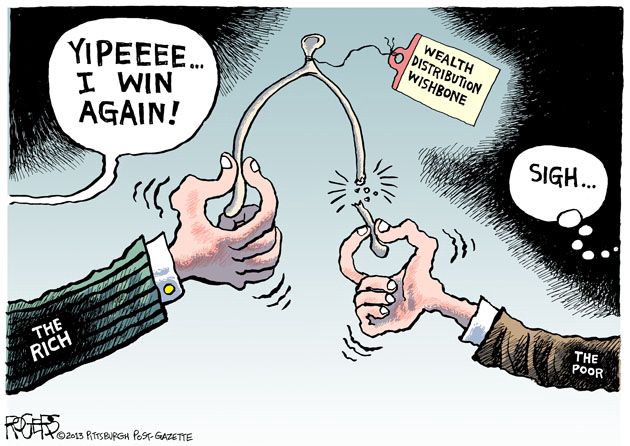
The problem of income inequality in America extends all the way back to the Gilded Age. The rise of Standard Oil and the Carnegie Steel Company, to show some examples, serve as evidence of the growing wealth of the United States during that time. Businessmen like John D. Rockefeller and Andrew Carnegie grew exorbitantly rich, with their monopolies dominating industries and contributing to the country's growing wealth. Many Americans see the Gilded Age as an era of rapid economic growth, which pushed America into the international scene. On the outside, the country seemed to be in great shape: exports were high, businesses were booming, and the total income was at an unprecedented high. But, what was blind to foreign countries was that the wealth in America was lopsided: while the rich lived in their mansions, the poor lived in tenements, stuck in poverty due to the meager wages they received. The country looked like everyone was experiencing economic growth, but looks are often deceiving, as America was going through a stage of massively increasing income inequity. To successfully gauge the extent to which the nation's income was mainly produced by the wealthy, Corrado Gini invented the Gini Index, sometimes called the Gini Coefficient. The Gini Index served to measure the state of income inequality in a country by comparing it to a hypothetical scenario where wealth was equally distributed. When paired with a Lorenz Curve, the Index allows viewers to see the actual state of income inequality within a nation, putting aside looks and focusing on the numbers at hand. In the present day, America finds itself plagued with income inequality, especially during the pandemic. Billionaires such as Elon Musk and Jeff Bezos have become the new Rockefeller and Carnegie, as their wealth has skyrocketed over the past year, while the middle and lower class saw their finances hit hard. The Gini Index is a crucial tool America can use to tackle income inequity, as a future is possible where wealth is equally distributed. Despite constant claims that income inequality is not a major problem in today's society, we believe that, due to its increasing trend over the past few decades, income inequity will cause the American economy to struggle and alinetate both the middle and lower class unless it can be countered by adequate political and social change.
Click here to start learning about Lorenz Curves, the Gini Index, and their basic qualities.